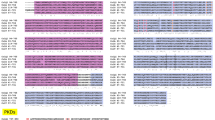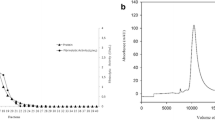Abstract.
A collagenolytic protease was purified to homogeneity from thermophilic Bacillus sp. strain MO-1. The protease from strain MO-1 showed high activity toward type I and IV collagens and gelatin. However, peptide substrates (4-phenylazobenzyloxycarbonyl-Pro-Leu-Gly-Pro-Arg and 2-furylacryloyl-Leu-Gly-Pro-Ala) for collagenases were inert as substrates. The collagenolytic protease cleaved oxidized insulin B-chain at 11 sites and degraded type I and IV collagens into anonymous small pieces, suggesting that the protease digests collagens at multiple sites. The collagenolytic protease was far more thermostable than a mesophilic Clostridium histolyticum collagenase. The collagenolytic protease possesses two salient features: (1) it has a very large molecular mass, 210 kDa, and consists of two, identical 105-kDa subunits; (2) it belongs to a serine protease group. The high molecular mass is unique among serine proteases but common for collagenases. The features of the enzyme from strain MO-1 suggest that it is a new collagenolytic protease which is distinct from previously reported collagenases and serine proteases.
Similar content being viewed by others
Author information
Authors and Affiliations
Additional information
Received revision: 4 May 2001
Electronic Publication
Rights and permissions
About this article
Cite this article
Okamoto, .M., Yonejima, .Y., Tsujimoto, .Y. et al. A thermostable collagenolytic protease with a very large molecular mass produced by thermophilic Bacillus sp. strain MO-1. Appl Microbiol Biotechnol 57, 103–108 (2001). https://doi.org/10.1007/s002530100731
Received:
Accepted:
Issue Date:
DOI: https://doi.org/10.1007/s002530100731




